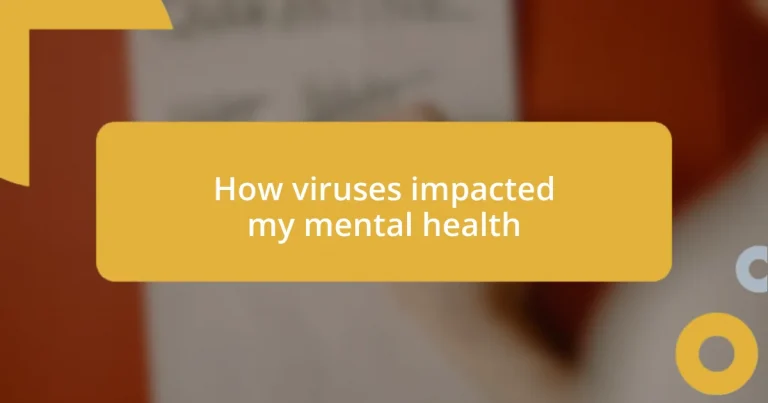Key takeaways:
- Viruses can significantly impact mental health, leading to anxiety, depression, and social withdrawal due to fear and isolation during outbreaks.
- Maintaining routines, connecting with others, and practicing mindfulness are effective coping strategies during illness to manage emotional health.
- Seeking professional help can provide valuable tools for managing emotions and validating feelings, contributing to personal healing and resilience post-recovery.
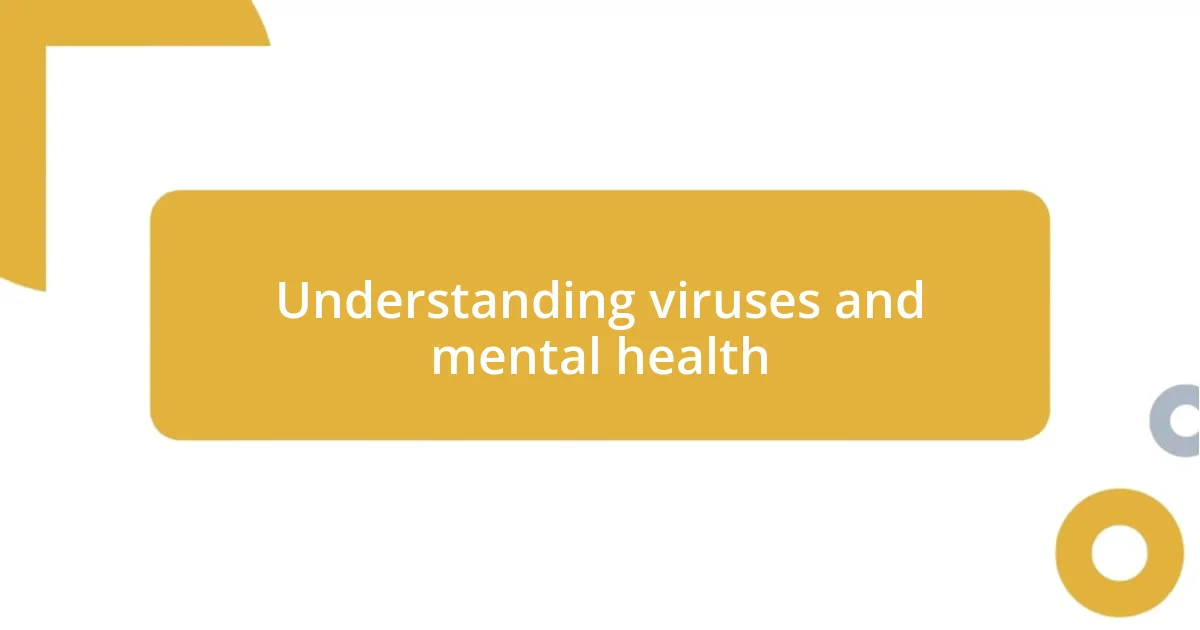
Understanding viruses and mental health
Viruses can create stress and anxiety, and I remember how overwhelmed I felt during the initial COVID-19 outbreak. Every news update seemed to pile on fear, making me question my safety and the health of loved ones. Isn’t it interesting how an invisible entity can turn our mental landscape upside down?
Research shows that infections can influence our brain chemistry, potentially leading to mood disorders. I’ve noticed myself feeling easily irritable or down during flu season, and it makes me wonder if there’s a connection between my body’s response and my mental state. Have you ever experienced a mood dip after being sick?
Moreover, the isolation from viral outbreaks can exacerbate feelings of loneliness and depression. I vividly recall weeks spent away from friends and family, and it wasn’t just the virus that affected me; it was the emotional toll of that separation that lingered long after. How does being cut off from our social networks impact our mental health? For me, it was a stark reminder of the importance of connection for our well-being.
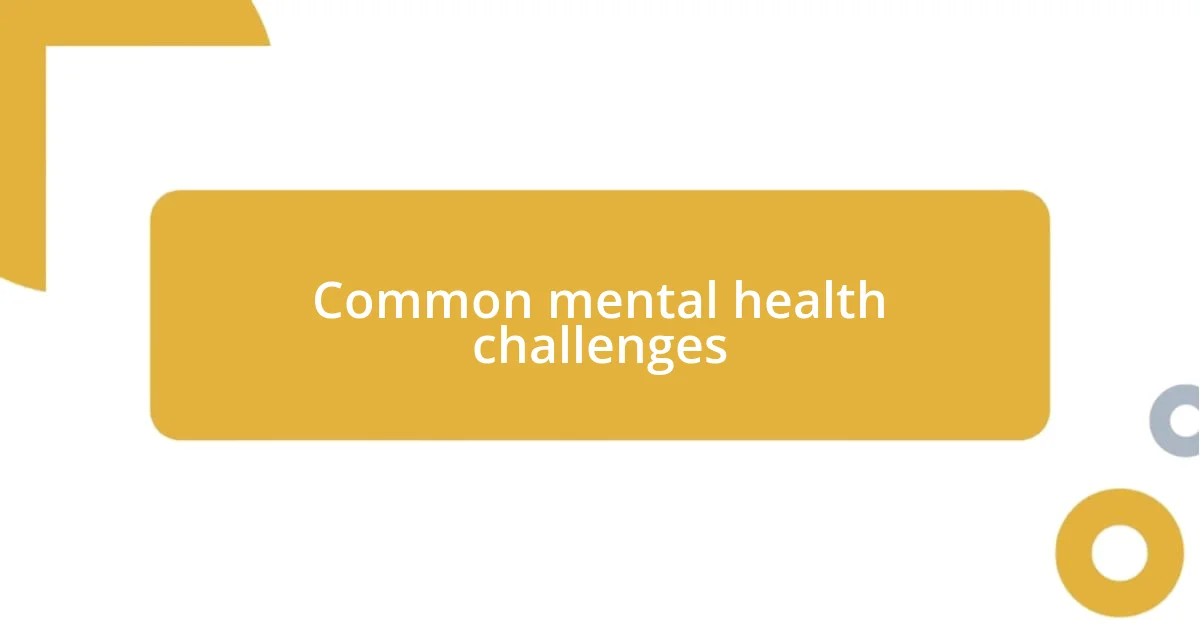
Common mental health challenges
It’s quite common for people to struggle with anxiety during viral outbreaks. I remember feeling my heart race at the slightest cough or sneeze from those around me. The constant worrying about my health, or the health of my loved ones, felt like a heavy weight I couldn’t shake off. Have you felt something similar? That lingering sensation of dread can often spiral into a more generalized anxiety that sticks around, even when the immediate threat seems to pass.
Depression can also surface as a result of these health crises. Reflecting on my own experiences, I noticed that the gloomy atmosphere created by the news and restrictions caused me to withdraw from the activities I loved. It’s as though the enthusiasm drained out, leaving behind just a sense of heaviness. Have you found it difficult to find joy in things you once loved during tough times? It’s essential to recognize how such feelings affect our day-to-day lives, perhaps leading us to neglect self-care or social interactions.
Lastly, the fear of contagion can lead to significant behavioral changes, impacting relationships. I found myself hesitating to meet friends, worried about putting them at risk. This hesitation transformed my social life from vibrant and fulfilling to one marked by distance and uncertainty. Have you ever experienced a similar shift? The emotional toll is profound; losing those connections can make the world feel smaller and more isolating.
| Mental Health Challenge | Description |
|---|---|
| Anxiety | Increased worry about health and safety, often leading to heightened stress levels. |
| Depression | Feelings of sadness and lack of interest in activities due to the emotional strain of isolation and fear. |
| Social Withdrawal | Behavioral changes causing a retreat from social interactions, which can worsen feelings of loneliness. |
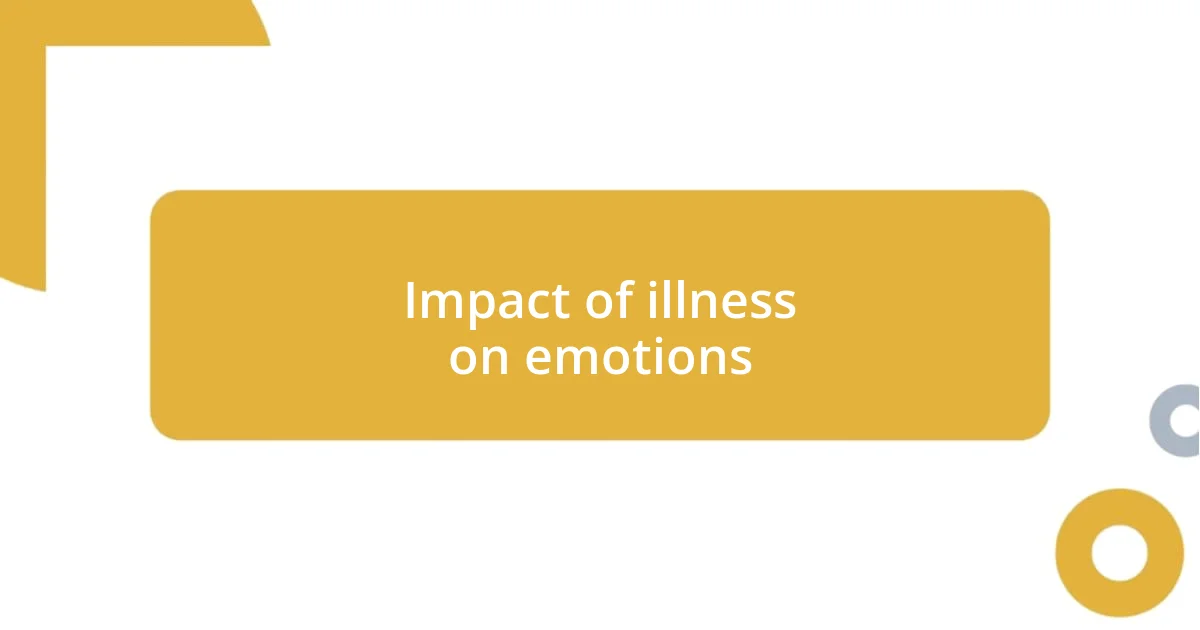
Impact of illness on emotions
Illness can bring about a whirlwind of emotions that often feel overwhelming. I vividly recall feeling restless and anxious when I was ill, unable to focus on anything but my symptoms. Losing my routine due to being unwell added to that unease, leaving me to grapple with feelings of helplessness and frustration. Have you ever noticed how unpredictability in health can shadow even the sunniest days?
- Frustration: The inability to engage in daily activities can evoke irritability, especially when you’re stuck at home feeling unproductive.
- Isolation: Being sick often means missing social events, leading to a deep sense of loneliness that can linger.
- Hopelessness: Chronic illness can drain your spirit, leaving behind feelings of despair and questioning the future.
This emotional impact isn’t always easy to pinpoint. I remember a time when a simple cold led me into a spiral of negative thoughts. It was as if a fog settled over my mind, clouding my perspective. Day-to-day joys felt muted, and I found myself reflecting on moments of happiness with a bittersweet sense of loss. It’s striking how something as simple as an illness can shift the entire emotional landscape, don’t you agree?
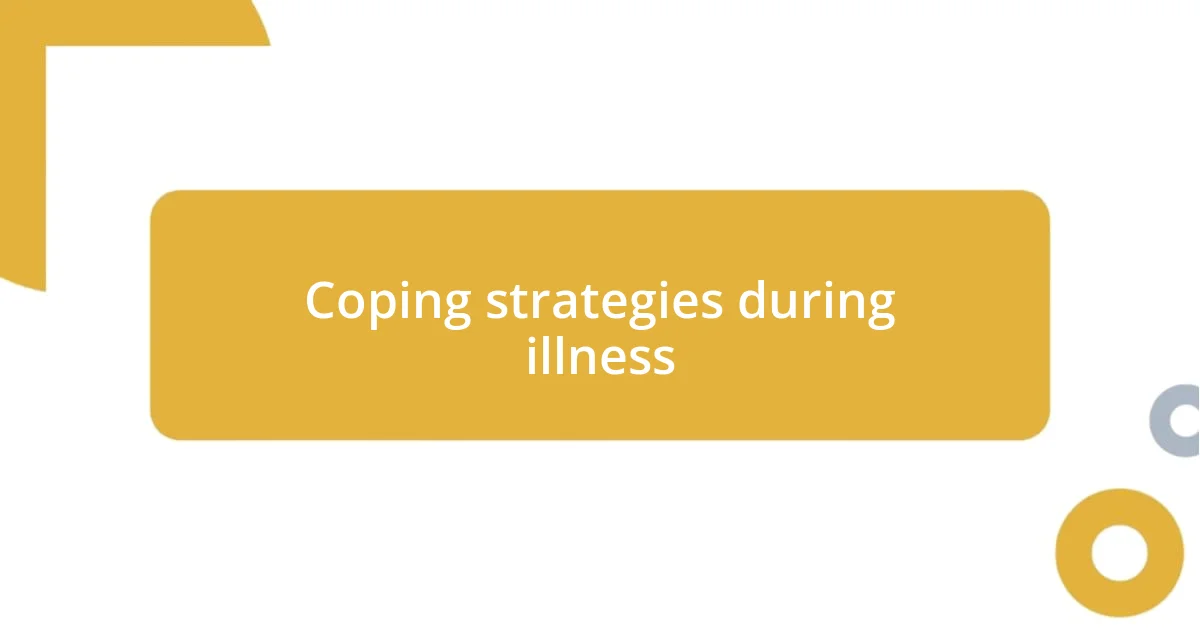
Coping strategies during illness
Finding effective coping strategies during illness was crucial for me. When I was down with a virus, I quickly learned the importance of maintaining a sense of routine, even if it looked different from my normal life. I’d set aside a little time each day to read or listen to music, which offered moments of escape that felt refreshing amidst the chaos. Have you ever found solace in small, familiar activities during tough times?
In my experience, connecting with others was equally essential. Video calls became a lifeline, allowing me to feel less isolated while still protecting my health. I remember sharing a laugh with friends over a virtual game night; it reminded me that joy could still exist, even from a distance. Have you tried reaching out to loved ones in creative ways? I found that these connections not only boosted my spirits but also reinforced the importance of community support, which is so vital during challenging moments.
Lastly, practicing mindfulness was a game changer for me. Incorporating deep breathing exercises helped me to navigate my anxiety. Just focusing on my breath for a few minutes made a noticeable difference in calming my racing thoughts. Have you experimented with mindfulness techniques? I believe they can provide a grounding effect that is especially valuable when illness disrupts our emotional equilibrium.
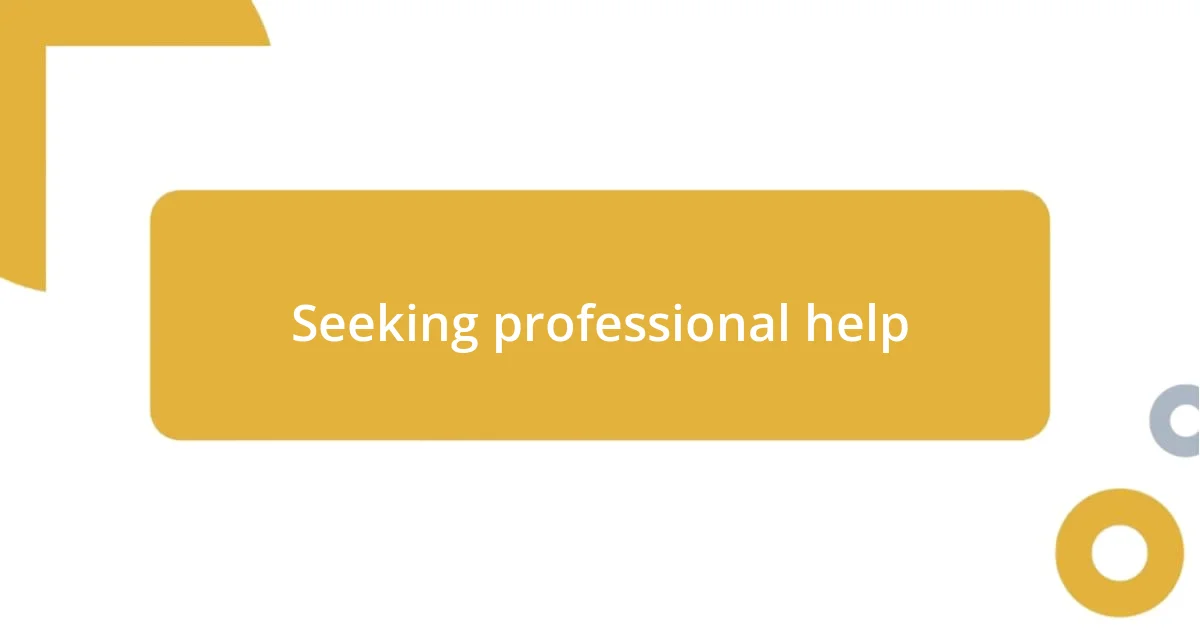
Seeking professional help
When I finally decided to seek professional help, it felt like a weight had been lifted from my shoulders. I remember my first therapy session vividly; walking into that office was a leap of faith. Have you ever felt that mix of hope and anxiety? I certainly did. It was reassuring to talk about my struggles with someone who was trained to understand the complexities of mental health arising from illness.
In therapy, I learned valuable skills to manage my emotions more effectively. The therapist introduced me to cognitive-behavioral techniques, allowing me to challenge negative thought patterns that had formed during my illness. It felt empowering to recognize that I could shift my perspective, even when things seemed bleak. If you’re contemplating professional help, I encourage you to consider how it might provide the tools to reshape your narrative.
These sessions were not just about understanding my feelings; they became a safe space for exploring deep-rooted fears and anxieties. I found relief in discussing how my physical health impacted my mental well-being. It was eye-opening to realize that sharing my experiences with an expert validated my feelings, something I often questioned on my own. Have you ever felt the liberation that comes from simply being heard? That’s what seeking help did for me—it allowed me to start healing from the inside out.
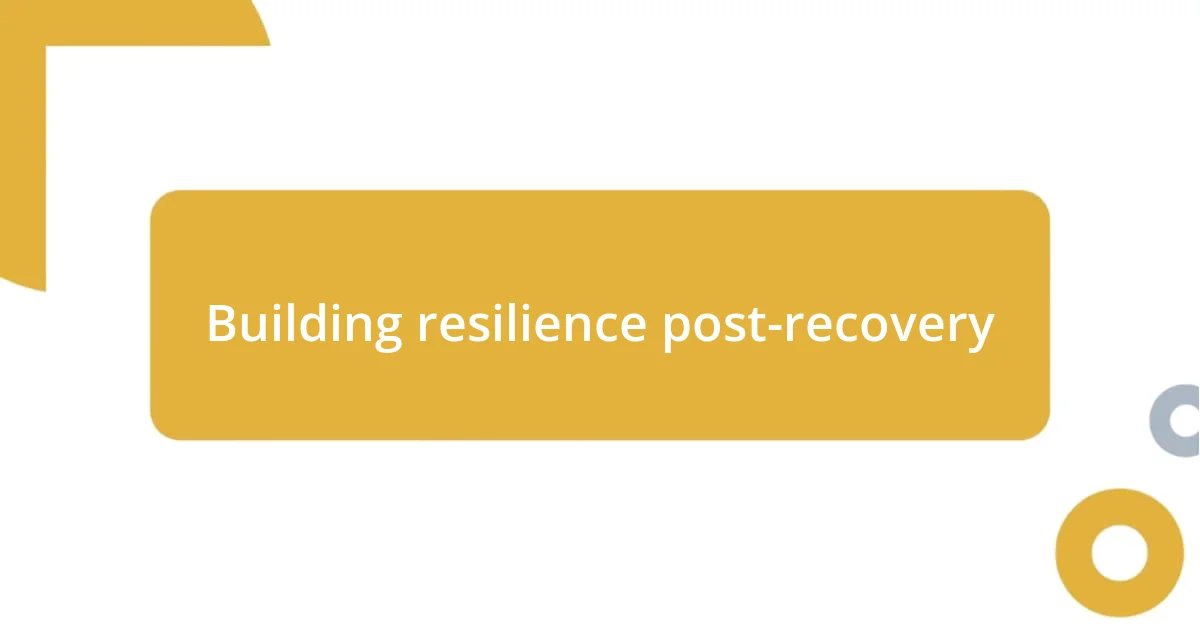
Building resilience post-recovery
Building resilience after recovery was truly a transformative experience for me. I remember standing in my kitchen one evening, reflecting on how far I’d come. It dawned on me that overcoming the virus was just the beginning; I needed to cultivate a deeper strength. Have you ever felt that urge to grow stronger after a setback? For me, it was about creating new habits that nurtured my mental health, like journaling my thoughts and feelings to process the whirlwind of emotions.
As I transitioned back to normal life, I found that surrounding myself with positivity made a remarkable difference. One evening, I invited friends over for a simple dinner; the laughter and support reminded me how vital relationships are for resilience. It struck me that recovery isn’t just about healing from illness, but also about fostering bonds that uplift us. Have you considered how your social circle can bolster your strength during tough times? This sense of community became my fortress, reinforcing the idea that resilience thrives in connection.
I also discovered the importance of setting boundaries; learning to say “no” was liberating. There were moments when I felt overwhelmed by obligations, and I realized that protecting my mental space was essential. I saw it as a dedicated effort to prioritize my well-being. Have you found the courage to establish boundaries in your life? For me, it was a vital lesson in self-care—one that reinforced my capacity to bounce back stronger than before.












